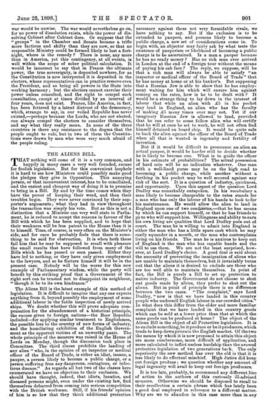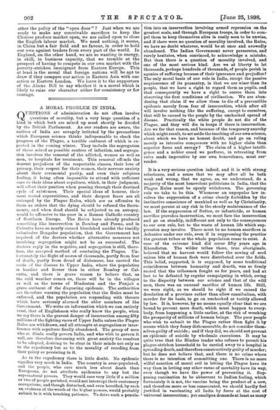THE ALIENS BILL. T HAT nothing will come of it is
a very common, and happily in many cases a very well founded, excuse for foolish legislation. But for this convenient loophole it is bard to see how Ministers could possibly make good the pledges they give in Opposition. This annoying person, or that inconvenient interest, has to be conciliated, and the easiest and cheapest way of doing it is to promise to bring in a Bill. By and by the time comes when they have the power of keeping their word, and then their troubles begin. They were never convinced by their sup- porter's arguments ; what they had in view throughout the transaction was simply his vote. But as this is not a distinction that a Minister can very well state in Parlia- ment, he is reduced to accept the reasons in favour of the Bill with which he has been supplied, and to hope that their weakness will be less patent to the House than it is to himself. Time, of course, is very often on the Minister's side, and for once he probably feels that there is some- thing to be said for obstruction. It is when both these fail him that he may be supposed to recall with pleasure the small results that have followed from many of the Bills which he has passed or seen passed. Either they have led to nothing, or they have only given employment to the lawyers, and so he flatters himself it will be in the present case. Nobody will be the worse for this new example of Parliamentary wisdom, while the party will benefit by this striking proof that a Government of the right sort can be trusted not to disappoint its neighbour, " though it be to its own hindrance."
The Aliens Bill is the latest example of this method of legislation. It is difficult to imagine that any one expects anything from it, beyond possibly the employment of some additional labour in the futile inspection of newly arrived ships. We doubt whether this will prove adequate com- pensation for the abandonment of a historical principle, the excuse given to foreign nations—the Boer Republic included—for applying similar treatment to Englishmen, the possible loss to the country of new forms of industry, and the humiliating exhibition of the English Govern- ment as the apparent victims of an unworthy panic. The whole principle of the measure was raised in the House of Lords on Monday, though the discussion took place in Committee. The third clause prohibits the landing of any alien " who, in the opinion of an inspector or medical officer of the Board of Trade, is either an idiot, insane, a pauper, a person likely to become a public charge, or a person suffering fron any dangerous, contagious, or infec- tious disease." As regards all but two of the classes here enumerated we have no objection to their exclusion. We should have thought, indeed, that idiots, lunatics, and diseased persons might, even under the existing law, find themselves debarred from coming into serious competition with the British workman. Still, if his friends' opinion of him is so low that they think additional protection necessary against these not very formidable rivals, we have nothing to say. But if the exclusion is to be extended to paupers, and persons likely to become a public charge, a new set of considerations come in. To begin with, an objector may fairly ask by what tests the existence of pauperism or likelihood of becoming a public charge is to be ascertained. Is a man a pauper because he has no ready money ? Has no rich man ever arrived in London at the end of a foreign tour without the means of paying his cab fare ? The reply, we suppose, will be that a rich man will always be able to satisfy "an inspector or medical officer of the Board of Trade" that he has money at home or at his banker's. But supposing that a Russian Jew is able to show that ho has employ- ment waiting for him which will ensure him against coming on the rates, how is he to be dealt with ? It would be a strange thing to lay down in the interest of labour that while an alien with £5 in his pocket may land in England, an alien who has the faculty of making many times over may not. Yet if our imaginary Russian Jew is allowed to land, provided that he can refer to some fellow alien who will certify that be will at once be set to work, he will not often find himself detained on board ship. It would be quite safe to back the alien against the officer of the Board of Trade when all that is wanted is ingenuity and fertility of invention.
But if it would be difficult to pronounce an alien an actual pauper, it would be harder still to decide whether he is likely to become one. What is to guide the officer in his estimate of probabilities ? The actual possession of hard coin will be no indication whatever. One man with a well-lined purse may be on the high road to becoming a public charge, while another without a farthing in his pocket may be well secured against any risk of the sort. It is a question of industry, quickness, and opportunity. Upon this aspect of the question Lord Dudley was remarkably outspoken. In his vocabulary a man likely to become chargeable to the rates stands for a man who has only the labour of his hands to look to for his maintenance. He would allow the alien to land in England upon one of two conditions,—that he has means by which he can support himself, or that be has friends to go to who will support him. Willingness and ability to earn his own living are qualities that Lord Dudley puts out of court. The man he is willing to admit into England is either the man who has a little spare cash which he may easily squander in a month, or the man who contemplates living on his friends. The man he is anxious to keep out of England is the man who has capable hands and the will to use them. We are not the least surprised, how- ever, at Lord Dudley's choice. A good deal is said about the necessity of preventing the immigration of aliens who are unable to maintain themselves, but it invariably turns out that the aliens it is desired to exclude are those who are too well able to maintain themselves. In point of fact, the Bill is purely a Bill to set up protection to native industry. The Government do not choose to shut out goods made by aliens, they prefer to shut out the aliens. But in point of principle there is no difference between the two cases. " The complaint," says Lord Dudley, " now is that we have landed in this country people who undersell English labour in our crowded cities." In what does this differ from the older and more familiar complaint that we have landed in this country goods which can be sold at a lower price than that at which the same goods can be produced at home ? The object of the Aliens Bill is the object of all Protective legislation. It is to exclude something, be it produce or be it producers, which tends to keep down pricesin the English market. Of the two the means by which it is now proposed to attain this object are more cumbersome, more difficult of application, and more calculated to inflict useless hardship than the avowed protective legislation of two generations back. The only superiority the new method has over the old is that it is less likely to do effectual mischief. High duties did keep out foreign produce ; we question whether any amount of legal ingenuity will avail to keep out foreign producers.
It is too late, probably, to recommend any different line of action to the authors of this curiously ill-advised. measure. Otherwise we should be disposed to recall to their recollection a certain phrase which has lately been a good deal employed in reference to a different matter. Why are we to abandon in this case more than in any other the policy of the "open door" ? Just when we are ready to make any conceivable sacrifices to keep the Chinese produce market open, we are called upon to close the English labour market. We need nothing, it seems, in China but a fair field and no favour, in order to hold our own against traders from every part of the world. In England, on the other hand, we are so wanting in energy, in skill, in business capacity, that we tremble at the prospect of having to compete in our own market with the poverty-stricken immigrant from Eastern Europe. This at least is the moral that foreign nations will be apt to draw if they compare our action in Eastern Asia with our action in Eastern London. We leave it to the supporters of the Aliens Bill to say whether it is a moral which is likely to raise our character either for consistency or for -courage.



















































 Previous page
Previous page